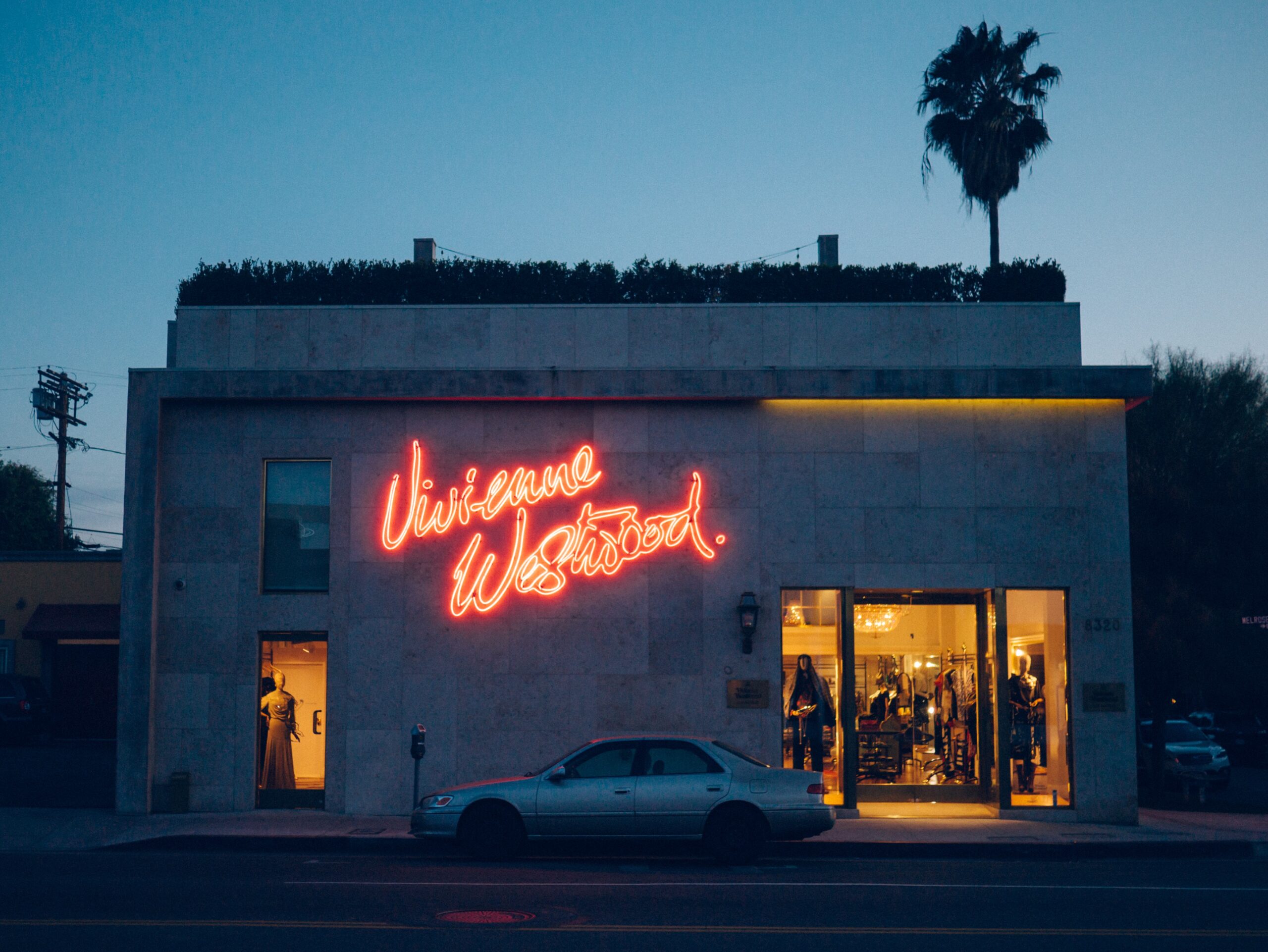Vivienne Westwood was born as Vivienne Isabel Swire in 1941 in England. After opening her first clothing store at age 30, she would spend the next half a century altering the very fabric of the fashion industry, defining and dressing the world of punk and stepping out in fashion choices that made conservative Brits sweat right through their suit jackets.
1971 marked the opening of a quaint boutique at 430 Kings Road, London. The shop was called “Let it Rock” at first, but would cycle through a roster of names as its style influence changed, like “Paradise Garage,” “Too Fast To Live, Too Young To Die” and, most famously, “SEX.” Westwood opened the store, alongside art student Malcolm McLaren and his friend, Patrick Casey, as a form of political protest, selling 1950’s “Teddy Boy” clothes and t-shirts with anti-establishment motifs. Under the name “SEX” the boutique sold sexy leathers, fetish pieces and clothes with pornographic images, some of which were later banned. The boutique’s four foot tall sign advertised “SEX” for all to see, and the interior walls were covered in the graffiti of SCUM Manifesto by Valerie Solanas, the radical feminist who famously shot Andy Warhol. The “SEX” shop was Westwood’s gateway into her famed partnership with the band, The Sex Pistols, which would truly solidify her position as the godmother of punk.
Westwood’s “SEX” shop was the birthplace of The Sex Pistols. Malcom Mclaren cobbled together the band from customers and employees at the “SEX” store, naming the band as such to include the store’s name. Westwood’s clothes adorned The Pistols as they performed across the United Kingdom, screaming, cursing, and hitting the occasional note. The notoriety of both the band and the store continued to rise, especially when The Sex Pistols’ “God Save The Queen” hit No. 2 on the UK singles chart in 1977, even after the BBC had banned it from their stations.
Westwood’s clothes had also gained popularity outside of the punk scene, and could be seen on figures across subcultures as well as other musical artists. Although The Pistols split in 1978, after a tumultuous and heavily self-destructive period, their lasting effect on the punk scene is undeniable. Whether this effect was ultimately positive, however; the punks are still debating.
After her collaboration with McLaren ended, Westwood went on to design solo under her eponymous label. Although first known for her punk rock designs, Westwood’s influences were many, including royalty and religious iconography. Her unmistakable logo even contains one of the British crown jewels: the Sovereign’s Orb.
Vivienne Westwood’s designs vary widely, with each collection often having very specific themes, and, of course, Westwood’s continual rebirth under new aesthetics. In the 80s, Westwood began what was known as her “pagan years.” Westwood turned her back to the punk movement after feeling disillusioned by the way punk style had been adopted by mainstream culture. During these years, her clothes were influenced greatly by the fashions of the upper-middle class. Her Harris Tweed collection during this time was hugely influential in the fashion industry, and many looks and patterns from the collection remain popular today.
In 1987, Vivienne debuted a style that many know her best for: corsets. Westwood’s influences shifted again, this time to 19th century English and French costuming. Her collections at this time, and into the 90s, referenced paintings of the Old Masters, ancient Greece and Rome and French boulle patterning, to name a few. The 90s was also the decade that Westwood famously received the Order of the British Empire from Queen Elizabeth, at which she twirled her dress for the paparazzi to reveal she was wearing no underwear.
In the 2000s, her focus shifted once again to climate change. In 2014, Westwood told The Guardian,“Climate change is my priority, not fashion.” Westwood promoted the work of Greenpeace and the charity, Cool Earth, as well as releasing collections protesting climate change and directing her own brand towards more sustainable production.
The passing of Vivienne Westwood in December of 2022 marked an incalculable loss for the fashion community, especially within a year of so many other losses, like that of André Leon Talley, Issey Miyake and Thierry Mugler. However, the Vivienne Westwood label won’t be closing anytime soon. “We have been working till the end and she has given me plenty of things to get on with.” Vivienne’s husband and collaborator, Andreas Kronthaler said,“Thank you darling.”
Additionally, a non-profit founded by Vivienne and her family, The Vivienne Foundation, will launch later this year. The foundation will be founded on four principles: Climate Change, Stop War, Protest Capitalism, and Defend Human Rights. Vivienne Westwood will be forever ingrained into the culture of fashion, punk and protest. As Chrissie Hynde, the lead singer of the rock band, the Pretenders, and formerly an assistant at Vivienne’s shop, said, “I don’t think punk would have happened without Vivienne and Malcolm.”
- Vivienne Westwood Broke the Mold - February 13, 2023

